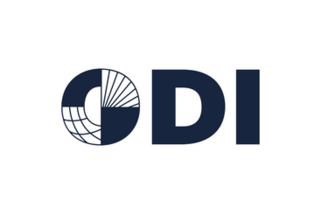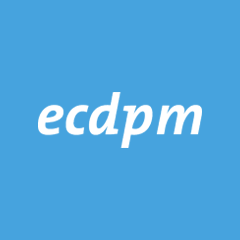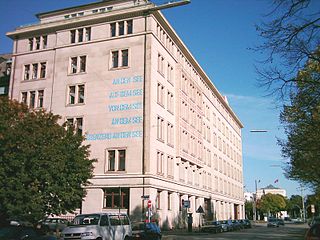
The United Nations University (UNU) is the think tank and academic arm of the United Nations. Headquartered in Shibuya, Tokyo, Japan, with diplomatic status as a UN institution, its mission is to help resolve global issues related to human development and welfare through collaborative research and education.

A think tank, or policy institute, is a research institute that performs research and advocacy concerning topics such as social policy, political strategy, economics, military, technology, and culture. Most think tanks are non-governmental organizations, but some are semi-autonomous agencies within government, and some are associated with particular political parties, businesses or the military. Think tanks are often funded by individual donations, with many also accepting government grants.

ODI is a global affairs think tank, founded in 1960. Its mission is "to inspire people to act on injustice and inequality through collaborative research and ideas that matter for people and the planet." It does this through "research, convening and influencing, to lead new thinking and future agendas to deliver transformational change." Its chair is Suma Chakrabarti.

The World Maritime University(WMU), in Malmö, Sweden, is a postgraduate maritime university founded within the framework of the International Maritime Organization (IMO) - a specialized agency of the United Nations. Established by an IMO Assembly Resolution in 1983, the aim of WMU is to further enhance the objectives and goals of IMO and IMO member States around the world through education, research, and capacity building.

The Barcelona Centre for International Affairs (CIDOB) is a Spanish think tank headquartered in Barcelona, devoted to research in the field of international relations. It defines itself as an "independent institution" that studies specifically "global issues that affect governance at different levels, from international to local". Legally, CIDOB is a private foundation endowed with a board of trustees made up of the main public institutions and universities of Barcelona and Catalonia. Both the centre and the foundation are governed by statutes, a code of ethics, and a master plan. At present, CIDOB is the oldest think tank in Spain and one of the most influential in its area, at the European level.

The European Centre for Development Policy Management, more commonly known as ECDPM, is a think tank founded in 1986. It is headquartered in Maastricht, Netherlands and has a second office in Brussels, Belgium.
The Institute for International Political Studies, founded in 1934, is the oldest Italian think tank specialised in international affairs. ISPI approaches international affairs in a sound pragmatic manner, monitoring geopolitical areas as well as major global trends. Comprehensive interdisciplinary analysis is ensured by close collaboration with specialists, academic and non-academic, in political, economic, legal, historical and strategic studies and an ever-growing network of think tanks, research centers and universities in Europe and abroad. Its headquarters are in Palazzo Clerici, a splendid example of 18th-century Milanese patrician building which boasts among its treasures the famous room with a Tiepolo fresco.

DCAF- ; Geneva Centre for Security Sector Governance is an intergovernmental foundation-based think tank that provides research and project support to states and international actors in improving security sector governance and reform.

The German Institute for Global and Area Studies, also known as GIGA, is a German research institute. It analyses political, economic, and social developments in Africa, Asia, Latin America, as well as the Middle East. It combines its analysis with comparative research on international relations, development and globalisation, violence and security, and political systems. GIGA researchers are sought after by policymakers to advise Germany's Federal Foreign Office, members of Parliament and other branches of the German federal government. The institute is based in Hamburg and has an office in Berlin.
The Lee Kuan Yew School of Public Policy is an autonomous postgraduate school of the National University of Singapore (NUS), named after the late former Prime Minister of Singapore, Lee Kuan Yew.

The United Nations University World Institute for Development Economics Research (UNU-WIDER) is part of the United Nations University (UNU). UNU-WIDER, the first research and training centre to be established by the UNU, is an international academic organization set up with the aim of promoting peace and progress by bringing together leading scholars from around the world to tackle pressing global problems.
The Lakshman Kadirgamar Institute of International Relations and Strategic Studies (LKI) is a foreign policy think tank currently based in Colombo, Sri Lanka. The Minister of Foreign Affairs of Sri Lanka is ex officio the Chairman of LKI. LKI conducts independent research and functions as an autonomous organisation. LKI was established in 2006 and is named after the late Sri Lankabhimanya Lakshman Kadirgamar, PC, MP, and former Sri Lankan Foreign Minister. The Institute is the realisation of a goal actively pursued by the late Minister, to fulfill the country's need for a think tank in the field of foreign policy research and engagement. Its stated mission is 'to engage in independent research of Sri Lanka’s international relations and strategic interests, and to provide insights and recommendations that advance justice, peace, prosperity and sustainability.'

CIFE - the Centre international de formation européenne is a not-for-profit European institution of higher education and research established in 1954. CIFE encompasses educational and research activities promoting European integration and governance, multilingualism and student mobility. CIFE educates European and international students as future Policy Officers in European institutions and international organisations, a professional title which is recognised by the French state.

The United Nations University Institute on Comparative Regional Integration Studies (UNU-CRIS) is a Research and Training Institute of the United Nations University (UNU). Based in Bruges, Belgium since 2001, UNU-CRIS specializes in the comparative study of regional integration and the provision of global and regional public goods, including environmental stability, poverty reduction, peace, and justice.
The Leibniz-Zentrum für Marine Tropenforschung (ZMT) in Bremen is a German institute for research and developments for tropical and subtropical coastal areas and ecosystems.

Fundação Getulio Vargas is a Brazilian higher education institution and think tank founded on December 20, 1944.
The International Centre for Policy Studies (ICPS) is an independent NGO, founded in 1994 which aims to promote public policy concepts and practice and apply them to influential policy research that affects both the public and private sectors in Ukraine.

The KDI School of Public Policy and Management is a government-run graduate school located in Sejong City, South Korea and is affiliated to the Korea Development Institute (KDI) and a member of the National Research Council for Economics, Humanities, and Social Sciences. The school was first established in 1997 in Dongdaemun District, Seoul, before moving to Sejong City in 2015 under the South Korean government's actions to establish the city as the de facto administrative capital of the country. The school specializes in fostering international experts in the field of development economics and public policy.

The Global Governance Institute(GGI) is an independent, international non-profit think tank based in Brussels. It was founded in 2010 and brings together senior policy-makers, scholars and practitioners in order to devise, strengthen and improve forward-looking approaches to global governance through research, education and policy advice.
The FRIDE was an independent European think tank headquartered in Madrid and Brussels. As of 2012, it was one of 55 think tanks in the country. It focused on the improvement of European views and ideas on various topics related to international development. It ceased its activities on 31 December 2015 due to lack of funding.














